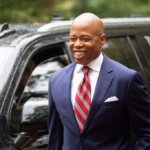The House Judiciary Committee is seeking testimony from a FBI analyst who confirmed to Twitter content moderators that first son Hunter Biden’s “laptop from hell” was genuine — on the same day that The Post’s bombshell report on the hard drive’s contents was censored by the social media giant.
Judiciary chairman Jim Jordan (R-Ohio) sent a letter Thursday requesting a transcribed interview with the FBI staffer who “played a key role” in the bureau’s campaign “to suppress true information about Biden family influence peddling shortly before the 2020 presidential election,” according to a copy of the missive exclusively obtained by The Post.
“Even though the FBI had been in possession of this laptop for nearly a year and had verified the provenance of its contents, the FBI made the institutional decision to refuse to answer direct questions from social media companies about the laptop’s authenticity—despite months of constant information sharing up to that time,” wrote Jordan to the unnamed analyst.
“Put simply, after the FBI conditioned social media companies to believe that the laptop was the product of a foreign malign influence operation, the FBI stopped its information sharing, allowing social media companies to censor the New York Post story on the incorrect basis that it was Russian disinformation,” he said.
Over more than 30 meetings with Twitter, now X, and other social media platforms in the lead-up to the 2020 election, bureau officials harped on the likelihood of a Russian “hack and leak” operation targeting the Biden family, with a focus on Hunter leaning on his father’s position while having a nearly $1 million-per-year salaried board seat at Ukrainian energy firm Burisma Holdings.
When The Post’s story on the then-second son introducing his dad to a Burisma executive was published on Oct. 14, 2020, Twitter and other platforms immediately censored it.
On a separate call with Facebook, the FBI declined to verify the laptop’s authenticity.
The suppression occurred despite a phone call with Twitter in which the anonymous FBI analyst pointed out that the laptop was “real,” before another member from the bureau’s General Counsel’s Office interrupted.
“Somebody from Twitter essentially asked whether the laptop was real. And one of the FBI folks who was on the call did confirm that, ‘Yes, it was,’ before another participant jumped in and said, ‘no further comment,’” Laura Dehmlow, section chief of the FBI’s Foreign Influence Task Force, testified to the Judiciary panel in July.
Dehmlow now serves as deputy director of the Office of the Director of National Intelligence’s (ODNI) National Counterintelligence and Security Center, which works with “private sector entities at risk of foreign intelligence penetration” and will “issue public warnings regarding intelligence threats to the US.”
The Russia Unit Chief of the FBI’s Foreign Influence Task Force later held a conference call with Twitter, Facebook and Google to confirm there was no evidence that Hunter Biden’s laptop was Russian disinformation — without mentioning that the bureau had possession of it since 2019.
“As a result, social media companies continued to censor the story, relying on the FBI’s earlier warnings,” Jordan said.
The Judiciary Committee has been asking for the FBI analyst who spoke out to sit for a transcribed interview with members and staff since November 2023 — but been unaware of the staffer’s name until now.
“Your testimony is critical to our oversight and to inform potential legislative reforms, such as the possible enactment of new statutory limits on the Executive Branch’s ability to work with technology companies and other intermediaries to censor speech,” Jordan told the analyst.
The chairman asked for a response by Oct. 4.
The FBI verified the authenticity of the materials on Hunter’s abandoned laptop in November 2019, an IRS whistleblower testified to the House Ways and Means Committee last year — but current and former G-men claimed ignorance about its origin.
Twitter’s deputy general counsel, James Baker, who served in the same position at the FBI from 2014 to 2017, pushed then-head of trust and safety Yoel Roth to block The Post’s reports, claiming “the materials may have been hacked.”
FBI special agent Elvis Chan told Twitter and Facebook moderators the day after the Oct. 14 Post scoop “that there was no current evidence to suggest any foreign connection or direction of the leak” — but later denied under oath that he was involved in pressuring either social media company.
And 51 former intelligence officials also circulated a letter to discredit both of The Post’s reports on emails from Hunter’s laptop — an influence effort prompted by a phone call between then-Biden campaign adviser Antony Blinken and former CIA Director Michael Morell.
The notorious “Spies Who Lie” said the leaked emails had “all the classic earmarks of a Russian information operation.”
Hunter’s laptop was entered into evidence as part of special counsel David Weiss’ criminal gun case against the first son in Delaware earlier this year.
In a pivotal moment at the June trial, FBI Special Agent Erika Jensen said under oath that the bureau had long verified it belonged to the first son.








